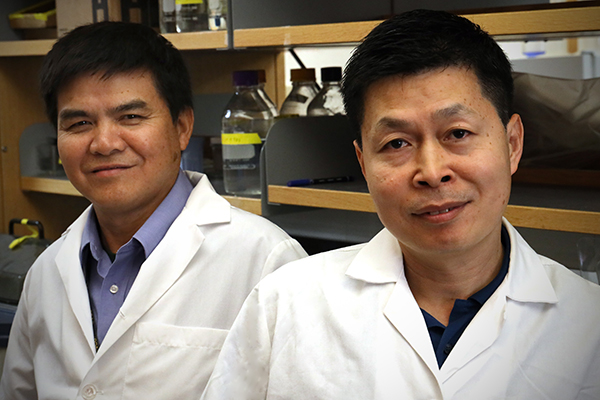Latest News
Research
NCI Cancer Moonshot grant supports new approach to boost immunotherapies at Massey
Aug 26, 2019

While immunotherapies have revolutionized the treatment of many cancers, nearly two-thirds of patients fail to respond to them. Funded by a 5-year, $2.1M National Cancer Institute (NCI) Cancer Moonshot Grant, VCU Massey Cancer Center scientists Shawn Wang, Ph.D., and Xianjun Fang, Ph.D., are combining their expertise in an effort to improve those response rates.
The researchers will look closely at the relationship between a metabolic process known as fatty acid oxidation (FAO) and its effects on dendritic cells, a key cell type of the host immune system that recognizes threats and recruits other immune cells to the area in response.
“My research is focused on metabolism and cancer, while Shawn primarily focuses on tumor immunology and immunotherapy,” said Fang, a member of the Cancer Cell Signaling research program at VCU Massey Cancer Center. “My lab had already developed a mouse model to study how a gene called CPD1A impacts fatty acid oxidation in cancer cells, so we were able to use that as a starting point to gather the evidence we needed to prove to the NCI that this is an area of research worthy of investment.”
FAO is a process that converts fatty acids to adenosine triphosphate (ATP). Nicknamed the “energy currency of life,” ATP is a molecule that stores and transports chemical energy within cells. While many people are familiar with glucose as a source of energy, fatty acids account for nearly half of all ATP production. They can be converted directly from food, or stored in fat for use at a later time. CPT1A is responsible for transporting fatty acid to cells’ mitochondria where it undergoes FAO.
By genetically disrupting the expression of CPT1A in dendritic cells, the researchers are able to disrupt FAO and test whether it impacts the effectiveness of immunotherapies in the mouse model. These experiments were supported by one of Massey’s Pilot Project Program grants, and they led to some exciting preliminary findings.
“Our initial observations suggested that increased fatty acid oxidation impairs the function of dendritic cells, and the absence of CPT1A in dendritic cells led to a dramatic improvement in response to immunotherapies,” says Wang, who is the Mary Anderson Harrison Distinguished Professor in Cancer Research and a member of the Cancer Molecular Genetics research program at Massey. “We want to better understand why this happens and how it can be exploited to improve the effectiveness of current and future immunotherapies.”
In addition to understanding the biological and chemical mechanisms of FAO in dendritic cells, the scientists plan to test the effects of CPT1A inhibition on different immunotherapies including immune checkpoint inhibitors and therapeutic vaccines. They also plan to test currently available FDA-approved drugs that inhibit FAO for the treatment of other conditions such as heart disease. If these drugs help improve the effectiveness of immunotherapies in the laboratory, they could be quickly translated to clinical trials in humans.
“While others are looking into metabolic processes in different types of immune cells, this is the first time they have been explored in dendritic cells in the setting of cancer immunotherapies,” says Wang. “We’re very excited about the potential of this research, and we’re hopeful that it will lead to more interprogrammatic collaborations focusing on immunometabolism, a fast-emerging field of cancer research.”
Written by: John Wallace
Related News
Research
Robert A. Winn Clinical Investigator Pathway Program welcomes fourth cohort of medical student awardeesJul 8, 2025
Research
“We’re aiming for a cure.” Massey and VIMM researchers achieve potential breakthrough in brain cancer treatmentJun 24, 2025
Research
Massey researchers discover new genetic target that could shape the future of liver cancer treatmentJun 23, 2025

Get access to new, innovative care
Treatments in clinical trials may be more effective or have fewer side effects than the treatments that are currently available. With more than 200 studies for multiple types of cancers and cancer prevention, Massey supports a wide array of clinical trials.

Find a provider
Massey supports hundreds of top cancer specialists serving the needs of our patients. Massey’s medical team provides a wealth of expertise in cancer diagnosis, treatment, prevention and symptom management.
